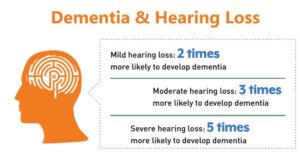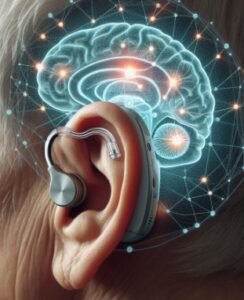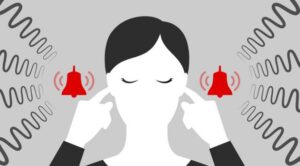As neurotologists, we see many patients with hearing loss. Family members are often concerned about their loved ones’ hearing. Frequently, there is additional concern about decreasing memory. Many family members and patients themselves intuitively question, “Is the hearing loss causing memory loss as well?”
Is there a relationship between hearing and memory?
In the medical field, memory loss is known as cognitive decline or dementia. There are many factors that cause cognitive decline. Age, genetics, and medical conditions like diabetes all influence cognitive decline. We have recently discovered that hearing loss contributes to cognitive decline as well.
memory loss is known as cognitive decline or dementia. There are many factors that cause cognitive decline. Age, genetics, and medical conditions like diabetes all influence cognitive decline. We have recently discovered that hearing loss contributes to cognitive decline as well.
Untreated hearing loss takes a toll on the brain. Over time, untreated hearing loss leads patients to isolate and withdraw. It is analogous to untreated high blood pressure’s effect on the heart. Over time, increased work on the heart damages it and can lead to a heart attack. In the same way, untreated hearing loss leads to cognitive decline. Just like treating blood pressure limits the risk of heart damage, treating hearing loss with hearing aids leads to decreased risk for cognitive decline.
How does better hearing protect my brain health?
There are several theories regarding that we will refer to as the substrate theory, the bandwidth theory, and the social interaction theory.
The substrate theory refers
The bandwidth theory refers to the idea that memory formation requires brain power or cognitive bandwidth. The struggle of hearing with untreated hearing loss occupies a large portion of your brain power and therefore, there is less available to devote to the task of memory formation. Treating hearing loss with hearing aids leads to more availability of cognitive bandwidth and therefore more brain power is devoted to making memories. This leads to better memory retention.
The social interaction theory refers to the isolation that occurs with hearing loss. When your hearing loss is untreated, you often isolate yourself from others. Meeting friends at a restaurant is a chore with hearing loss, so you just don’t go. This results in net loss of interaction with others, which leads to decreased brain stimulation. Over time, brain function atrophies and memory retention suffers. Treating hearing loss with hearing aids leads to more social engagement, more brain stimulation, and better cognitive health.
Conclusion
The net effect of untreated hearing loss on brain function over time is negative. Thankfully, hearing loss is easy to diagnose and treat. Hearing aids not only improve hearing, but they also protect brain health as we age. Hearing aids are highly recommended to optimize hearing and brain health.



